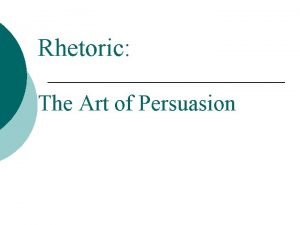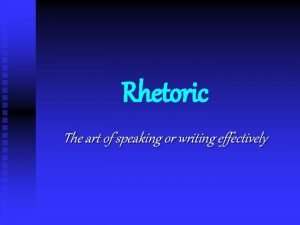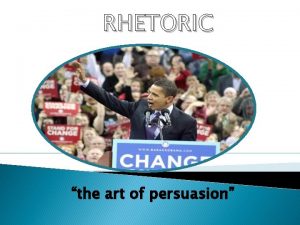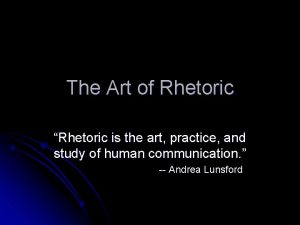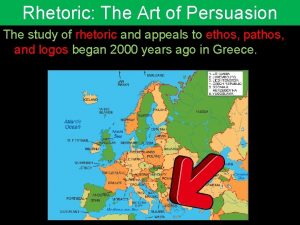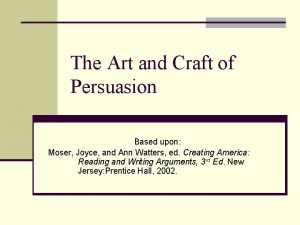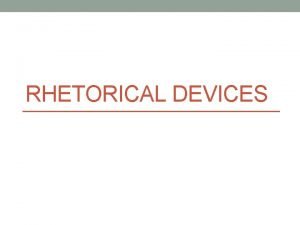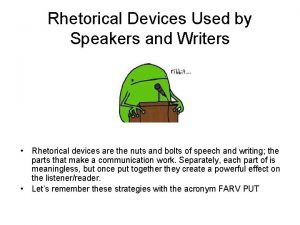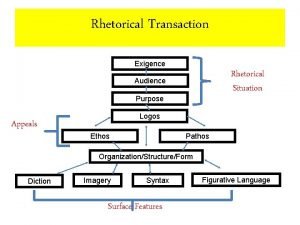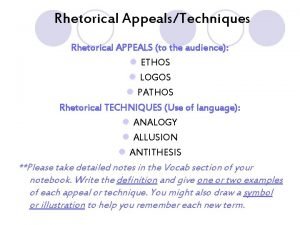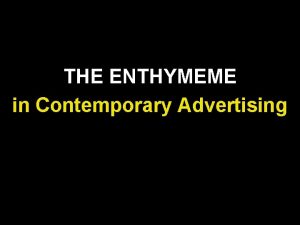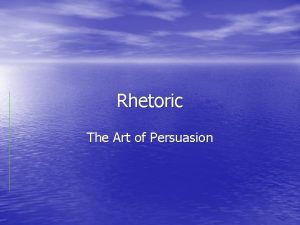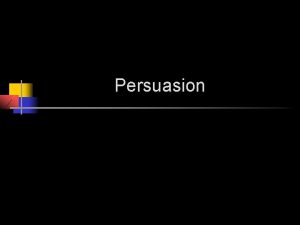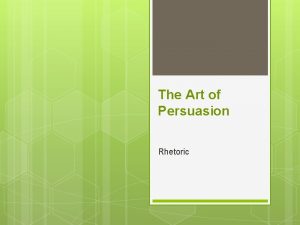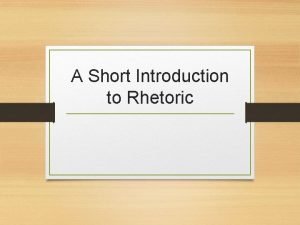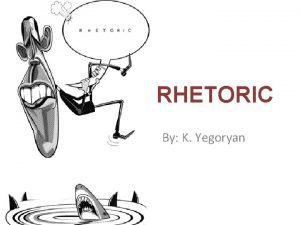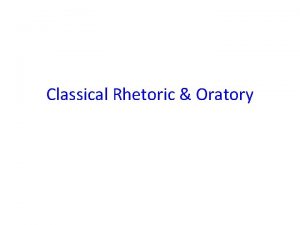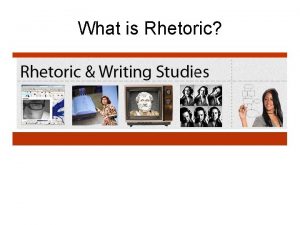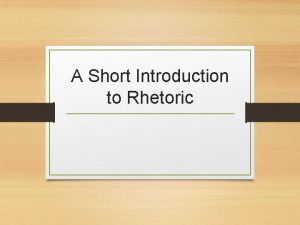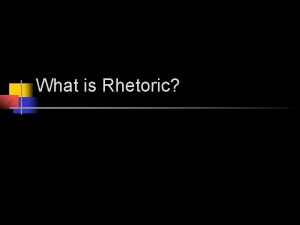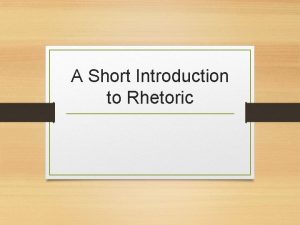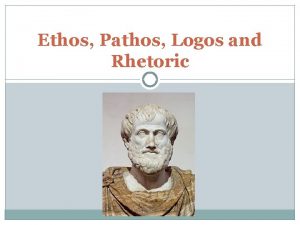Rhetoric The Art of Persuasion Persuasion Persuasion is




















- Slides: 20

Rhetoric: The Art of Persuasion

Persuasion “Persuasion is the name we give to the type of communication that brings about change in people. ” Bostrum, R. N. (1983). Persuasion. Englewood Cliffs, NJ: Prentice-Hall, p. 8. "Persuasion is intended communication that affects how others think, feel, and/or act toward some object, person, group or idea. “ Cegala, D. J. (1987). Persuasive communication: Theory and practice, 3 rd ed. Edina, MN: Burgess International, p. 13. “Persuasion takes place when a motivator is able to either change or confirm an existing attitude in the minds of listeners. ” Hazel, H. (1998). The power of persuasion, 2 nd ed. Dubuque, IA: Kendall-Hunt, p. 2.

Aristotle’s Rhetorical Triangle Logos Pathos Ethos

Aristotle’s Rhetorical Triangle

Rhetorical Devices: In rhetoric, a rhetorical device or resource of language is a technique that an author or speaker uses to convey to the listener or reader a meaning with the goal of persuading him or her towards considering a topic from a different perspective. Irony Metaphor Analogy Juxtaposition Sound devices: alliteration Structure devices: parallel structure Hyperbole

Is it persuasive? ¡ ¡ ¡ Whenever you read an argument, you must ask yourself, “Is this persuasive? And if so, to whom? ” There are several ways to appeal to an audience. Among the ways to appeal to an audience are appealing to logos, ethos, and pathos. These appeals are prevalent in almost all arguments.

Ethos- Character or Image (Credibility) ¡ Aristotle says that if we believe that a speaker has "good sense, good moral character, and goodwill, " we are inclined to believe what that speaker says to us.

Ethos- Character or Image (Credibility) trustworthiness ¡ reliability ¡ expert testimony ¡ reliable sources ¡ fairness ¡ Effect of argument: Demonstrates author’s reliability, competence, and respect for the audience’s ideas and values through reliable and appropriate use of support.

f o s c i t t s i a s r h e e o t W rac d y t e? i a l i h c dab v a h e l r l i c B s i h t

f o s c i t t s i a s r h e e o t W rac d y t e? i a l i h c dab v a h e l r l i c B s i h t

Pathos- emotional and belief based appeals ¡ ¡ Related to the words – pathetic, sympathy, and empathy When you accept a claim based on how it makes you feel without fully analyzing the rationale, you are acting on pathos. Emotive language: love, fear, sympathy, patriotism, pride, guilt, hate, or joy Most arguments are heavily dependant upon pathos appeals.

Pathos- emotional and belief based appeals Vivid, concrete language ¡ Emotionally loaded language ¡ Connotative meanings ¡ Emotional examples ¡ Analogies ¡ Narratives of emotional events ¡ Emotional tone ¡ Figurative language ¡ Rhetorical questions ¡ Repetition Affect of argument: Motivates people to act based on their emotions sometimes forgetting their logic. ¡

1 in every 3 children grow up without a family. Adopt a child. Be a hero.


Web Site Banner

Will you support our Troops?


Logos- appeals to logic (inductive & deductive reasoning) ¡ ¡ ¡ Using theories (i. e. , Theory of Relativity; Theory of Evolution) Denotative meanings/reasons Literal and historical analogies Inductive: synthetic process used to Definitions reason from Parallel structure particulars to Factual data and statistics probable conclusions Quotations Deductive: Citations from experts and authorities analytical process Informed opinions- logical reasoning used to move from Case studies/ Experiments generalizations to Analogies structurally certain Restatement conclusions Affect of argument: creates a cognitive, rationale response

Logos- Persuassive Inoculation ¡ Persuasive inoculation/counter argument- Giving a dose of the opponents argument in order to refute it. ¡ The persuader doesn’t argue his own opinion. He attacks the opponents’ opinion. ¡ “Inoculating" the opposing viewpoint with a weakened form of their own original argument has the power to make your own argument more effective.

Warm up: Use one example for each of the three appeals to argue why students should be able to dress however they choose.
 Rhetoric the art of persuasion
Rhetoric the art of persuasion The art of speaking and writing
The art of speaking and writing Logos ethos pathos
Logos ethos pathos Rhetoric: the art of persuasive writing and public speaking
Rhetoric: the art of persuasive writing and public speaking Rhetoric is the art of
Rhetoric is the art of Which greek philosopher defined the art of persuasion
Which greek philosopher defined the art of persuasion The art and craft of persuasion
The art and craft of persuasion Parallelism definition literature
Parallelism definition literature Tricolon literary device
Tricolon literary device Rhetoric
Rhetoric Context space cat
Context space cat Rhetorical transaction
Rhetorical transaction Juxtaposition examples in speeches
Juxtaposition examples in speeches Branches of rhetoric
Branches of rhetoric You eat what you touch
You eat what you touch Ethos rhetoric definition
Ethos rhetoric definition Pick it up rhetoric
Pick it up rhetoric Enthymeme rhetoric
Enthymeme rhetoric American rhetoric 100 speeches
American rhetoric 100 speeches 3 types of rhetoric
3 types of rhetoric Purdue owl visual rhetoric
Purdue owl visual rhetoric
